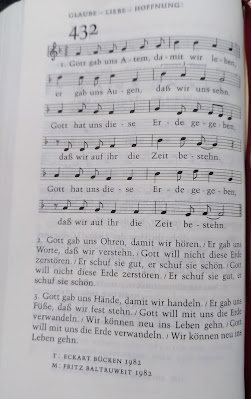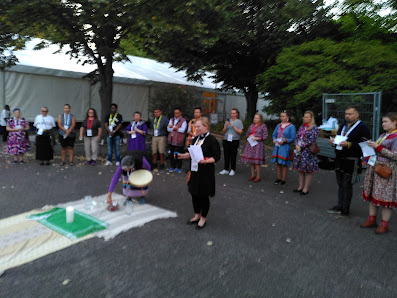 |
| Photo: Albin Hillert, WCC |
Today the opening of the 11th General Assembly of the World Council of Churches took place. It is fantastic to be with almost 5 000 other Christians from the entire world. Colourful!
I want to highlight
three of the speakers. The first one was the report of the Moderator, Dr Agnes Aboum.
What a strong leader for this enormous, ecumenical organisation. One could
really sense her passion for justice and peace. She spoke about …
… Jesus’ compassion for stigmatised minorities, for those for whom little compassion is visible today.
After her the outgoing acting General Secretary, Prof. Ioan Sauca delivered his report. The person sitting next to me said, that it was a hot report. And I agree. He did not shy away from controversial issues.
For instance, he defended the decision not to exclude the Russian Orthodox Church from the World Council of Churches, which some member churches had asked for. He said that the WCC is needed as a place for dialogue. But at the same time, he clearly took the side of Ukraine.
Human sexuality was another issue that he spoke to. Of course, in a diplomatic way but still, he was clear that everyone must respect the dignity of every human being, to defend and affirm human rights of all. In the context of human sexuality this means that many churches must revisit their theologies.
Antisemitism
was also in the report, and he clearly stated that the WCC …
… oppose, reject, condemn, and denounce all forms of antisemitism.
At the same time, he took a strong stance for the Palestinian people. And used the same words, saying that the WCC ...
... support equal human rights for Palestinians and oppose, reject , condemn and denounce situations when these are not respected.
The third speaker I want to mention is the Federal President of Germany, Frank-Walter Steinmeier. He made a strong impression when he thanked the WCC that the council had accepted German churches as members already in 1948, only three years after WWII.
He also discussed antisemitism, Russia’s war on Ukraine – and he really criticised the Russian Orthodox Church. At the same time, he mentioned that more that 100 Russian Orthodox priests had opposed the war.
Later today
the opening prayer gathered all participants in the prayer tent. Beautiful and
very spiritual. With much singing and dancing. I am so privileged to be part of
this.













